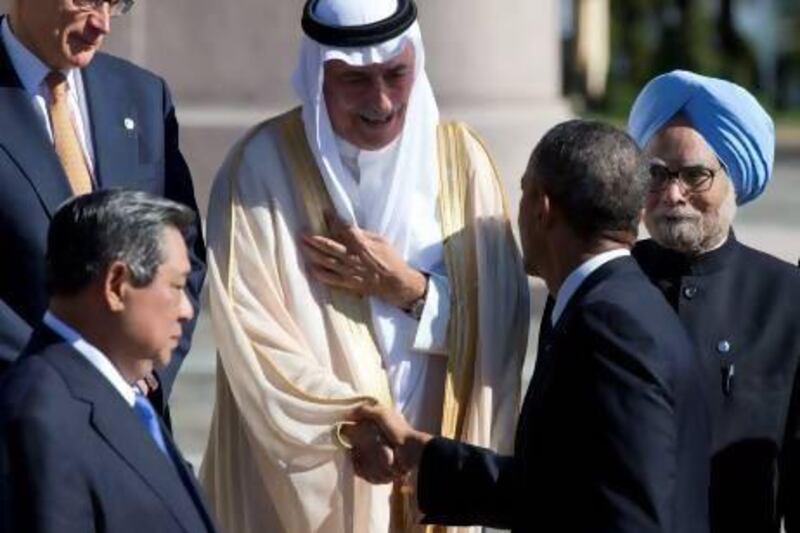LONDON // Ten members of the G20, including Saudi Arabia, joined the United States yesterday in calling for a "strong international response" to a chemical weapons attack blamed on the Syrian government.
The statement, released by the White House, did not explicitly call for military action against the regime of Bashar Al Assad, but US administration officials argued that it amounted to support of Barack Obama's move towards targeted strikes.
"We condemn in the strongest terms the horrific chemical weapons attack in the suburbs of Damascus on August 21st that claimed the lives of so many men, women, and children," the statement said. "The evidence clearly points to the Syrian government being responsible for the attack, which is part of a pattern of chemical weapons use by the regime."
The statement was signed by the US, Saudi Arabia, Australia, Canada, France, Italy, Japan, South Korea, Spain, Turkey and the United Kingdom. It was released after leaders from the world's 20 largest economies wrapped up a two-day summit in St Petersburg, Russia.
Russia, China and Brazil were among the countries that did not endorse the statement, remaining adamantly opposed to any military action against Syria not sanctioned by the UN.
Vladimir Putin, the Russian president, said at the end of the summit that he and Mr Obama had listened to each other in discussions between G20 leaders on Syria on Thursday night that went on until well after midnight.
But their differences were not resolved and both remain stuck to their respective positions on what to do about Syria and who was culpable for the chemical attack on the edge of Damascus. The US claims more than 1,400 people were killed.
Mr Putin said there was no evidence to support claims that the regime was behind the attack and suggested rebels could just as easily have used chemical weapons to force international action at a time when the Syrian military was pushing an advantage on the ground.
Moscow remains fiercely loyal to Damascus and Mr Putin warned against punitive US strikes, saying they could harm the global economy, stifle growth and "destabilise" the region.
"The use of force against a sovereign nation is only possible as self defence - and Syria hasn't attacked the United States - and on approval of the UN Security Council," Mr Putin said. "Those who do otherwise place themselves outside the law."
The Chinese president Xi Jinping, in his first comments on the August 21 attack, agreed with Mr Putin.
"A political solution is the only right way out for the Syrian crisis, and a military strike cannot solve the problem from the root," the Chinese news agency Xinhua quoted Mr Xi as telling Mr Obama.
Russia and China are both permanent members of the UN's Security Council and have veto power over any resolutions brought before the council.
The other three members, the US, Britain and France, all support military action even if Britain, after a parliamentary vote, will not take direct part in any military intervention.
Samantha Power, the American UN ambassador, on Thursday said the US would not seek UN approval should Washington decide finally to pursue punitive strikes.
Defending that position yesterday, David Cameron, the British prime minister, said it would be "contracting our foreign policy and our morality" to a possible Russian veto to go to the UN and said there was legal basis for action without Security Council approval.
Attention will now shift to Washington, where the US congress is expected to vote early next week on whether to support the White House and approve punitive strikes.
Setting the stage for an intense week of lobbying in Washington over the strike resolution, Mr Obama said he planned to make his case to the American people in an address on Tuesday.
Mr Obama laid out in new detail his reasoning for seeking congressional approval, saying it was because the use of chemical weapons in Syria did not pose an imminent threat to the United States or its allies - situations in which he said he would have responded immediately. But he said the use of weapons of mass destruction is a long-term threat to the United States and the world, and the US has the ability to respond with air strikes without the risk of putting troops on the ground.
"It's conceivable at the end of the day I don't persuade a majority of the American people that it's the right thing to do," Mr Obama said. "And then each member of Congress is going to have to decide."
Meanwhile, non-essential US diplomatic staff at the US embassy in Beirut and a diplomatic mission in southern Turkey were withdrawn yesterday, according to the State Department. Officials cited threats received.
Also late next week, the UN is expected to announce the results of tests on samples gathered by UN experts from the site of the attack.
The Syrian civil war was not on the official agenda of the G20 summit but completely overshadowed proceedings that for the first time since 2008 did not take place in the shadow of looming financial meltdown.
The summit's top priority was to strengthen global economic growth and the leaders of the 20 countries agreed several measures to tackle unemployment, fight corruption and cross-border tax evasion as well as build more resilient financial institutions, according to a final G20 Leaders' Declaration, that passed almost unnoticed amid all the attention on Syria.
okarmi@thenational.ae
* With additional reporting from Associated Press





